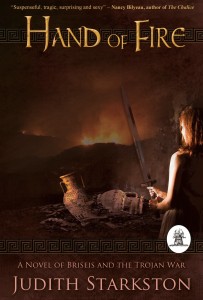
by fljustice | Sep 19, 2014 | Books, Fiction, Free stuff, Reviews, Wonderful Women
Book Review and Giveaway:
“Hand of Fire” by Judith Starkston
I get pitched a lot of books. I usually accept about one a month. I like most of them and write a paragraph or two on GoodReads.com, LibraryThing.com or Amazon.com. A very few get the full blog treatment. Hand of Fire by Judith Starkston is one of those I want to enthusiastically share with my fellow readers. Her novel has all the elements I look for in historical fiction: compelling characters, engaging plot, and fascinating setting.
About the book:
 The Trojan War threatens Troy’s allies and the Greek supply raids spread. A young healing priestess, designated as future queen, must defend her city against both divine anger and invading Greeks. She finds strength in visions of a handsome warrior god; will that be enough when the half-immortal Achilles attacks? Hand of Fire, a tale of resilience and hope, blends history and legend in the untold story of Achilles’s famous captive, Briseis.
The Trojan War threatens Troy’s allies and the Greek supply raids spread. A young healing priestess, designated as future queen, must defend her city against both divine anger and invading Greeks. She finds strength in visions of a handsome warrior god; will that be enough when the half-immortal Achilles attacks? Hand of Fire, a tale of resilience and hope, blends history and legend in the untold story of Achilles’s famous captive, Briseis.
My review:
I have a weakness for stories that shine a light on little known women or give silenced women a voice in the way Anita Diamant spoke for the biblical Dina (Joseph’s only sister) in her wildly popular The Red Tent. Starkston takes a similar approach through the story of Briseis. In the Iliad Briseis has only a handful of lines, yet she is a pivotal character in the narrative arc of the classic poem, sparking a rift between Achilles and Agamemnon that almost brings the Greek war against Troy to ruin. In the poem she expresses her love for Achilles in spite of the fact that he killed her brothers and husband, sacked her city, and reduced her status from princess to slave. A tall order to build a believable scenario where that could happen! Starkston does a beautiful job taking the slender clues about Briseis’ life and times and building believable characters. Briseis matures from an uncertain girl to a woman capable of determining her own destiny in this engaging story. (more…)

by fljustice | Mar 26, 2013 | Essays/Research, History, Wonderful Women, Writing
Where Are All the Strong Women?
 Readers of this blog know I like to highlight fiction and non-fiction that present capable women with strong personalities. I read a post in a forum recently that intrigued me. The person was looking for historical fiction recommendations, but “none of those anachronistic modern women dressed up in historical costumes crap.” I don’t think s/he was disparaging time travel fiction and, yes, I’ve read a few stories where the women seem to have more modern sensibilities than might be warranted. But not all strong females in historical fiction are anachronistic. I’ve read other blog posts by historical fiction writers also deploring recent criticism about strong women described by readers as “too modern” in spite of ample historical evidence that women did and thought as the writers wrote them. Where does the dissonance come from? Why would a reader think a woman couldn’t be a doctor in Late Antiquity, captain a whaling ship, or teach men to fly planes during WWII — all documented events?
Readers of this blog know I like to highlight fiction and non-fiction that present capable women with strong personalities. I read a post in a forum recently that intrigued me. The person was looking for historical fiction recommendations, but “none of those anachronistic modern women dressed up in historical costumes crap.” I don’t think s/he was disparaging time travel fiction and, yes, I’ve read a few stories where the women seem to have more modern sensibilities than might be warranted. But not all strong females in historical fiction are anachronistic. I’ve read other blog posts by historical fiction writers also deploring recent criticism about strong women described by readers as “too modern” in spite of ample historical evidence that women did and thought as the writers wrote them. Where does the dissonance come from? Why would a reader think a woman couldn’t be a doctor in Late Antiquity, captain a whaling ship, or teach men to fly planes during WWII — all documented events?
I blame school history books. The protagonist in my novel, Selene of Alexandria is a young woman who wants to become a physician in fifth century Alexandria — not a “healer” or midwife — a trained and apprenticed physician. There is ample written and archaeological evidence of women physicians through the ages, including this period. But if you don’t look outside the traditional history texts, you wouldn’t know that. (more…)
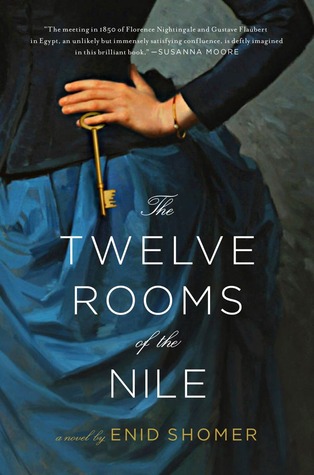
by fljustice | Oct 17, 2012 | Books, Fiction, Free stuff, Guest Post, Wonderful Women
Guest Post: Enid Shomer on “The Twelve Rooms of the Nile”
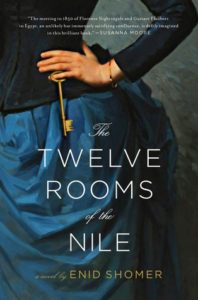 I just finished The Twelve Rooms of the Nile, a novel about the imagined meeting of Florence Nightingale and Gustave Flaubert when they both traveled the fabled river–before they became famous. It’s a lovely literary effort with wonderful insights into two intriguing characters. I’m pleased to host a guest post by the author Enid Shomer where she tells us how she came to know both these remarkable people and write about them. Ms. Shomer’s short fiction and poetry has appeared in The New Yorker, The Atlantic and The Paris Review among other publications. This is her first novel. Thanks to her publisher Simon and Schuster for providing two copies of this book for a giveaway (details at the end of the post.) If you want to learn more about Ms. Shomer and her writing, please visit her website. Enjoy! (more…)
I just finished The Twelve Rooms of the Nile, a novel about the imagined meeting of Florence Nightingale and Gustave Flaubert when they both traveled the fabled river–before they became famous. It’s a lovely literary effort with wonderful insights into two intriguing characters. I’m pleased to host a guest post by the author Enid Shomer where she tells us how she came to know both these remarkable people and write about them. Ms. Shomer’s short fiction and poetry has appeared in The New Yorker, The Atlantic and The Paris Review among other publications. This is her first novel. Thanks to her publisher Simon and Schuster for providing two copies of this book for a giveaway (details at the end of the post.) If you want to learn more about Ms. Shomer and her writing, please visit her website. Enjoy! (more…)
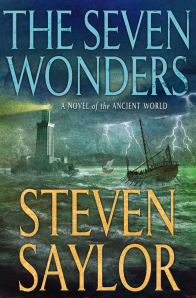
by fljustice | Jul 7, 2012 | Books, Fiction, Free stuff, Reviews
“The Seven Wonders” by Steven Saylor
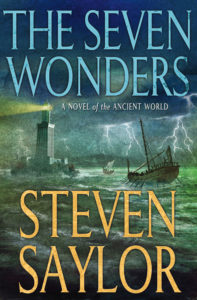 Gordianus the Finder is back in this prequel to Steven Saylor’s popular series of mysteries set in the Roman Republic of Cicero and Caesar. Gordianus is eighteen and embarks on the First Century BCE equivalent of a “Grand Tour” with his old tutor and famous poet Antipater of Sidon. As the Italian peninsula simmers with rebellion, the pair head east to visit the Seven Wonders of the World encountering murder, mysteries and political intrigues. Over the course of their year-plus journey, Gordianus evolves into “the Finder” series readers have come to know and love.
Gordianus the Finder is back in this prequel to Steven Saylor’s popular series of mysteries set in the Roman Republic of Cicero and Caesar. Gordianus is eighteen and embarks on the First Century BCE equivalent of a “Grand Tour” with his old tutor and famous poet Antipater of Sidon. As the Italian peninsula simmers with rebellion, the pair head east to visit the Seven Wonders of the World encountering murder, mysteries and political intrigues. Over the course of their year-plus journey, Gordianus evolves into “the Finder” series readers have come to know and love.
For the record, I am not a Gordianus fan. I very much enjoyed Saylor’s multi-generational epics Roma and Empire, which I reviewed, but didn’t take to the couple of Finder novels I sampled. Not because they were bad books, but because I’m not that into historical mysteries. Every reader has her quirks. This book has a distinctly different structure from the others. Saylor uses the journey to visit the Seven Wonders as a framework for several short stories (many of which were previously published in mystery and fantasy magazines.) Each Wonder gets a story with a few interludes, such as attending the Olympic Games and visiting the ruins of Corinth, resulting in ten chapters dealing with murder, witchcraft, ghosts and gods. As their journey continues, a larger mystery entangles Gordianus and Antipater with spies and other enemies of Rome. (more…)
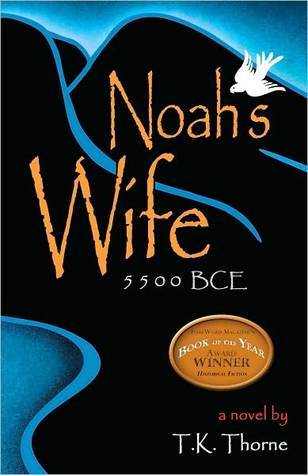
by fljustice | Aug 29, 2011 | Books, Fiction, Reviews
“Noah’s Wife” by T. K. Thorne
From the back:
Noah’s wife is Na’amah, a beautiful, brilliant girl with a form of autism (now) known as Asperger’s. She wishes only to be a shepherdess on her beloved hills in ancient Turkey—a desire shattered by her powerful brother’s hatred, the love of two men, and a looming disaster only she knows is coming.
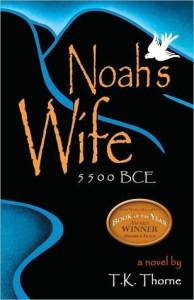 I got this book in the Historical Novel Society Conference goodie-bag and was intrigued. Asperger Syndrome runs in my family, so I was curious as to how T. K. Thorne would handle that aspect of her debut novel. She states in her “Acknowledgements” and “Postscript” that she doesn’t have AS and relied on research and particularly the writings of Dr. Temple Grandin, a well-known speaker and writer on the topic. (Dr. Grandin is autistic.) For the most part, I felt Thorne got it right. As she notes, this is a neurological condition that runs a vast spectrum of behaviors and can present as a severe disability up to creative genius. Every person with AS presents differently, but they all share a common difficulty with social engagement. They are “clueless” until they figure out, or someone teaches them, the social rules that most children seem to absorb with no instruction. There’s no reason to believe AS didn’t exist in 5500 BCE, but, from a Darwinian point of view, it was probably very rare. Loners, folks who didn’t “belong” or conform to group norms, would have had a significant survival disadvantage. This is how Na’amah describes herself:
I got this book in the Historical Novel Society Conference goodie-bag and was intrigued. Asperger Syndrome runs in my family, so I was curious as to how T. K. Thorne would handle that aspect of her debut novel. She states in her “Acknowledgements” and “Postscript” that she doesn’t have AS and relied on research and particularly the writings of Dr. Temple Grandin, a well-known speaker and writer on the topic. (Dr. Grandin is autistic.) For the most part, I felt Thorne got it right. As she notes, this is a neurological condition that runs a vast spectrum of behaviors and can present as a severe disability up to creative genius. Every person with AS presents differently, but they all share a common difficulty with social engagement. They are “clueless” until they figure out, or someone teaches them, the social rules that most children seem to absorb with no instruction. There’s no reason to believe AS didn’t exist in 5500 BCE, but, from a Darwinian point of view, it was probably very rare. Loners, folks who didn’t “belong” or conform to group norms, would have had a significant survival disadvantage. This is how Na’amah describes herself:
“My name, Na’amah, means pleasant or beautiful. I am not always pleasant, but I am beautiful. Perhaps that is why I am trundled atop this beast like a roll of hides for market and surrounded by grim-faced men. If my captors had bothered to ask me, I would have told them that their prize is of questionable value because my mind is damaged…Memories appear as images in my mind. Each word-sound I hear has its own color and shape and they fit together with the others in patterns that I can recall as easily as I can name every sheep on my hillside…I speak only truth, unwise as it may be, since lies distress me…my words and manner seem odd to other people. I am more comfortable with animals, who do not expect me to be any way than the way I am.” (more…)

The Trojan War threatens Troy’s allies and the Greek supply raids spread. A young healing priestess, designated as future queen, must defend her city against both divine anger and invading Greeks. She finds strength in visions of a handsome warrior god; will that be enough when the half-immortal Achilles attacks? Hand of Fire, a tale of resilience and hope, blends history and legend in the untold story of Achilles’s famous captive, Briseis.







